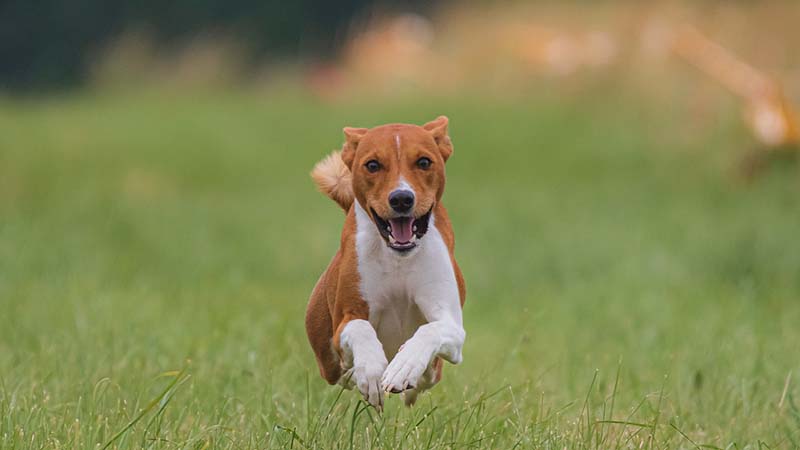Is My German Shepherd Overweight? Average Weight Explained

Updated on
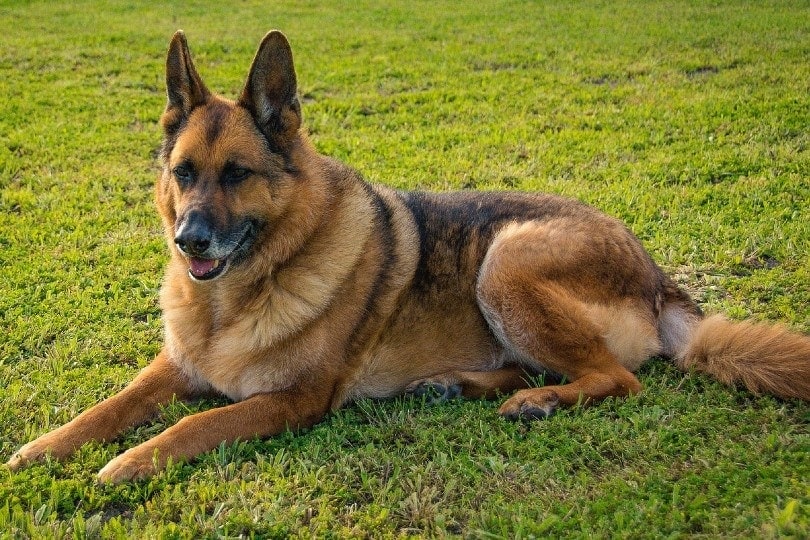
Many people overfeed their German Shepherds, causing the dog to be overweight. Sometimes, the weight gain is obvious, whereas other times, the dog may simply look healthy to the untrained eye. In either case, overweight German Shepherds experience a number of health conditions, like diabetes and arthritis.
Unfortunately, many regular people don’t know what a healthy dog looks like, causing them to overfeed their German Shepherd while thinking the dog is healthy. This gap in education causes over 50% of all dogs in the United States to classify as overweight or obese. The rough guide to follow is males should be between 66 and 88 pounds and females should be between 49 and 71 pounds.
To learn if your German Shepherd is overweight, keep reading.
What Counts as Overweight in a German Shepherd?
Veterinarians have created average healthy weight ranges for German Shepherd dogs. Most males will be between 66 and 88 pounds, whereas most females will be between 49 and 71 pounds. Unfortunately, this range only gives you a guide for how heavy your German Shepherd should be.
Many factors will determine your German Shepherd’s ideal weight, such as muscle mass, size, activity, and gender. As a result, two male German Shepherds may both be 88 pounds, but one of them could be considered healthy and the other could be considered overweight.
The reason for this is that the amount of fat is more important than the direct weight. A German Shepherd with a body mass of over 20% fat is considered overweight. Because purebred German Shepherds have similar body types, it can be easy to eyeball if your German Shepherd has too much fat.
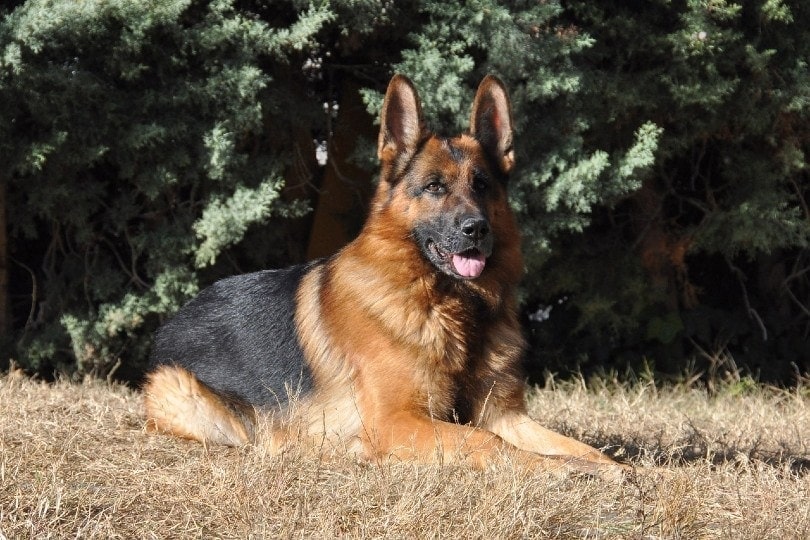
How to Know if Your German Shepherd Is Overweight
So, how can you know if your German Shepherd is overweight? Ideally, your vet should tell you that your dog is overweight at your regular checkup, but if your dog booms in weight in a short amount of time, you may need to perform an examination yourself.
Here are three questions you should ask yourself to get an understanding of your German Shepherd’s health:
Does Your German Shepherd Have Any Classic Signs of Being Overweight?
The first question you should ask yourself is if your German Shepherd shows any signs of being overweight. Because German Shepherds are so large, even a little bit of excess weight will cause signs elsewhere. Here are some signs that your German Shepherd is overweight:
- Difficulty breathing
- Pain while walking, running, etc.
- Unable to play as before
- Skin problems
- Arthritis
Although these signs do not guarantee your dog has issues with weight, they can give you a good idea if your German Shepherd is suffering from some sort of illness, such as weight or obesity.

What Does Your German Shepherd Look Like?
You should be able to simply look at your German Shepherd to determine if it is overweight. Of course, the German Shepherd shouldn’t look rotund or bloated in any way. If their waist appears larger than its back hock joints, your dog is likely overweight. The same is true if you look at your German Shepherd from the side and the abdomen appears to be even with the chest.
In contrast, you might find that your German Shepherd appears lean and has a waist the same distance as the space between its back knees. If that’s the case, your German Shepherd is most likely very healthy and of a suitable weight.
Can You Feel Your Dog’s Ribs?
One of the most accurate ways to determine if your German Shepherd is healthy is to feel their ribs. If you cannot feel your dog’s ribs without pushing a bit, it is almost guaranteed that your German Shepherd is overweight. In contrast, if you can too easily feel the ribs, it means the German Shepherd is underweight.
Visit a Vet
If your at-home test shows your German Shepherd as being overweight, take your pet to the vet. Ultimately, your veterinarian will determine if the German Shepherd is overweight, and they will help you come up with a game plan for targeting your dog’s health.
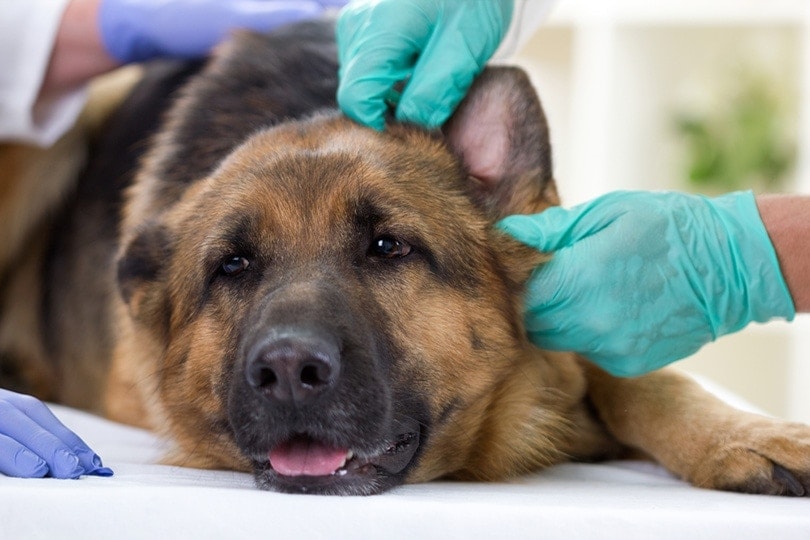
Tips for Keeping Your German Shepherd Healthy
If your vet determines that your German Shepherd is struggling with its weight, it’s important to put your German Shepherd on a weight loss plan immediately. Obesity will cause your fat German Shepherd to die quickly and experience more health issues along the way. So, you want to address the issue right on.
Exercise
Exercise is an important part of any dog’s plan to stay fit and healthy. German Shepherds are considered active dogs that need a lot of exercise. If your dog is not fairly active now, start integrating more exercise throughout the day and generally work in more hours as your dog’s endurance builds up.
Ideally, German Shepherds need an hour and a half of exercise a day. Shoot for this goal and continue it once your dog reaches its ideal weight. Keep in mind that exercise can be fun for both you and the dog.
Make sure not to force your German Shepherd to do too much at one time. Because overweight dogs are at more risk for heart issues and joint pain, overworking an overweight German Shepherd can result in a lot of pain for the dog.
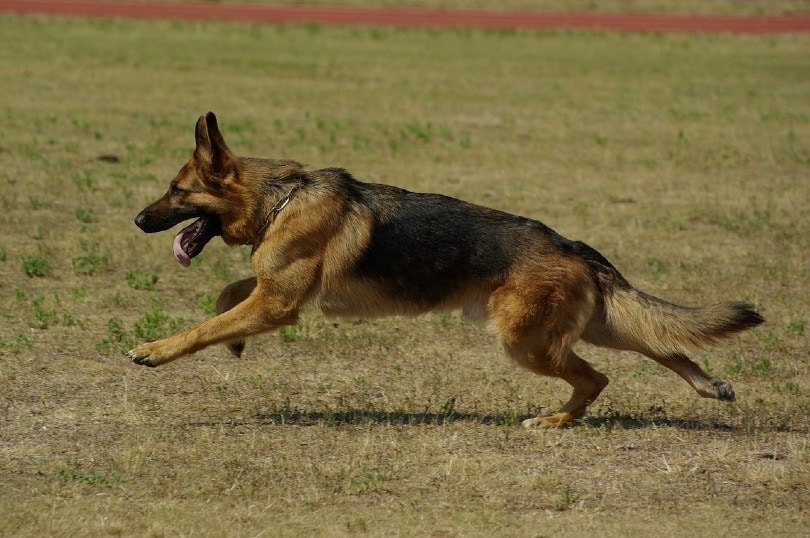
Food
Food is the other face of the coin. You need to make sure your German Shepherd is eating high-quality dog food and an appropriate amount of it. Many pet dogs are overweight because they are fed table scraps, processed food, and other foods that have no business going into their system.
Select a high-quality dry dog food made specifically for large dogs. Large dog food will contain special nutrients to nourish your German Shepherd’s joints, which is a must whenever the dog is overweight. Limit treats or remove them completely from the dog’s diet.
You can also get support by using our calculator tool for keeping your pup health and well-being:
The exact amount of calories an individual animal needs to maintain a healthy weight is variable and influenced by many factors including genetics, age, breed, and activity level. This tool is meant to be used only as a guideline for healthy individuals and does not substitute veterinary advice
Final Thoughts
Because German Shepherds are such active dogs, they are less prone to obesity than other breeds, but they can easily become obese if they are less active than they ought to be or are fed too many treats. Because obesity and being overweight can lead to serious health conditions, it’s important to nip the extra weight in the bud.
Even though your German Shepherd may be hesitant to cut out the treats or exercise some more, be firm yet fun with your dog. Play as much as possible and don’t give in to those adorable puppy eyes. In the long run, the German Shepherd will be much happier with its healthy weight.
Featured Image Credit: tr19001, Pixabay




